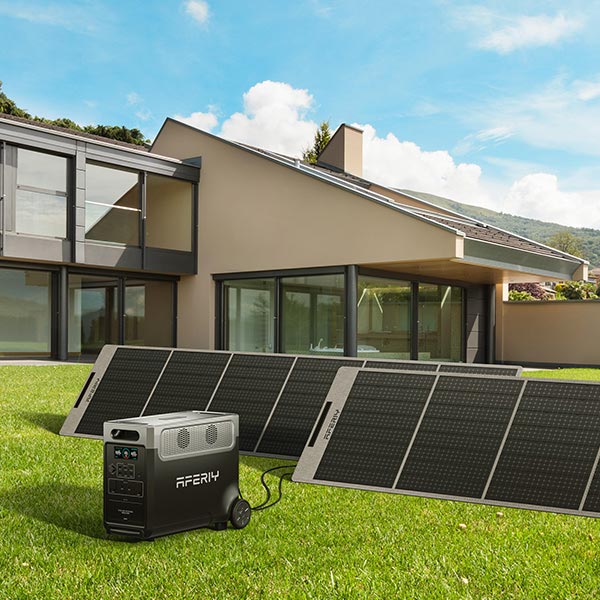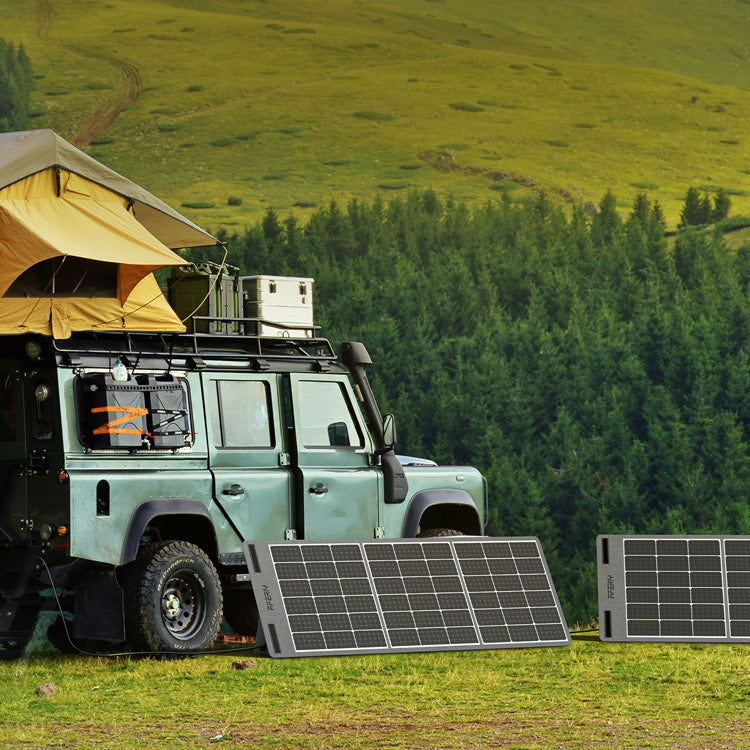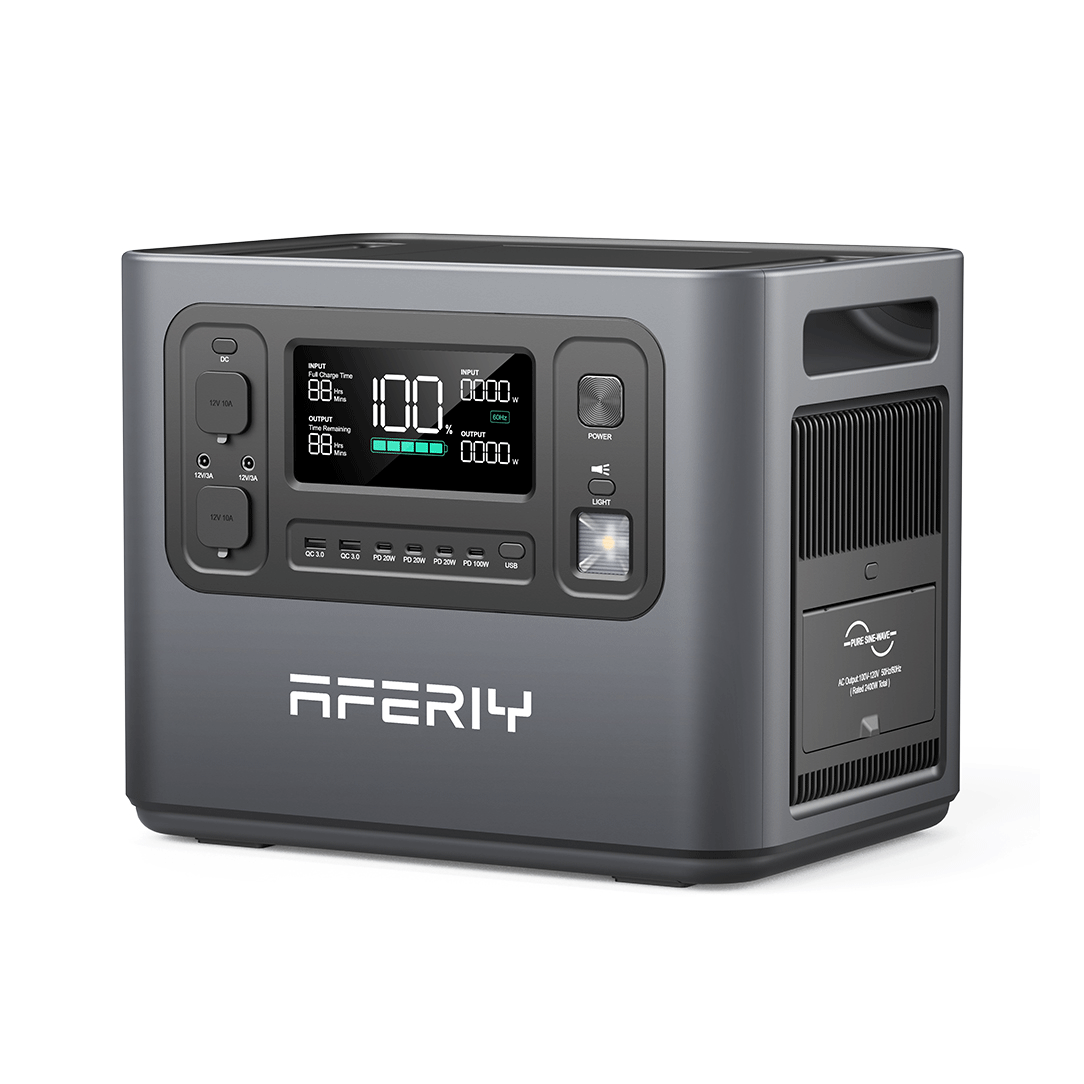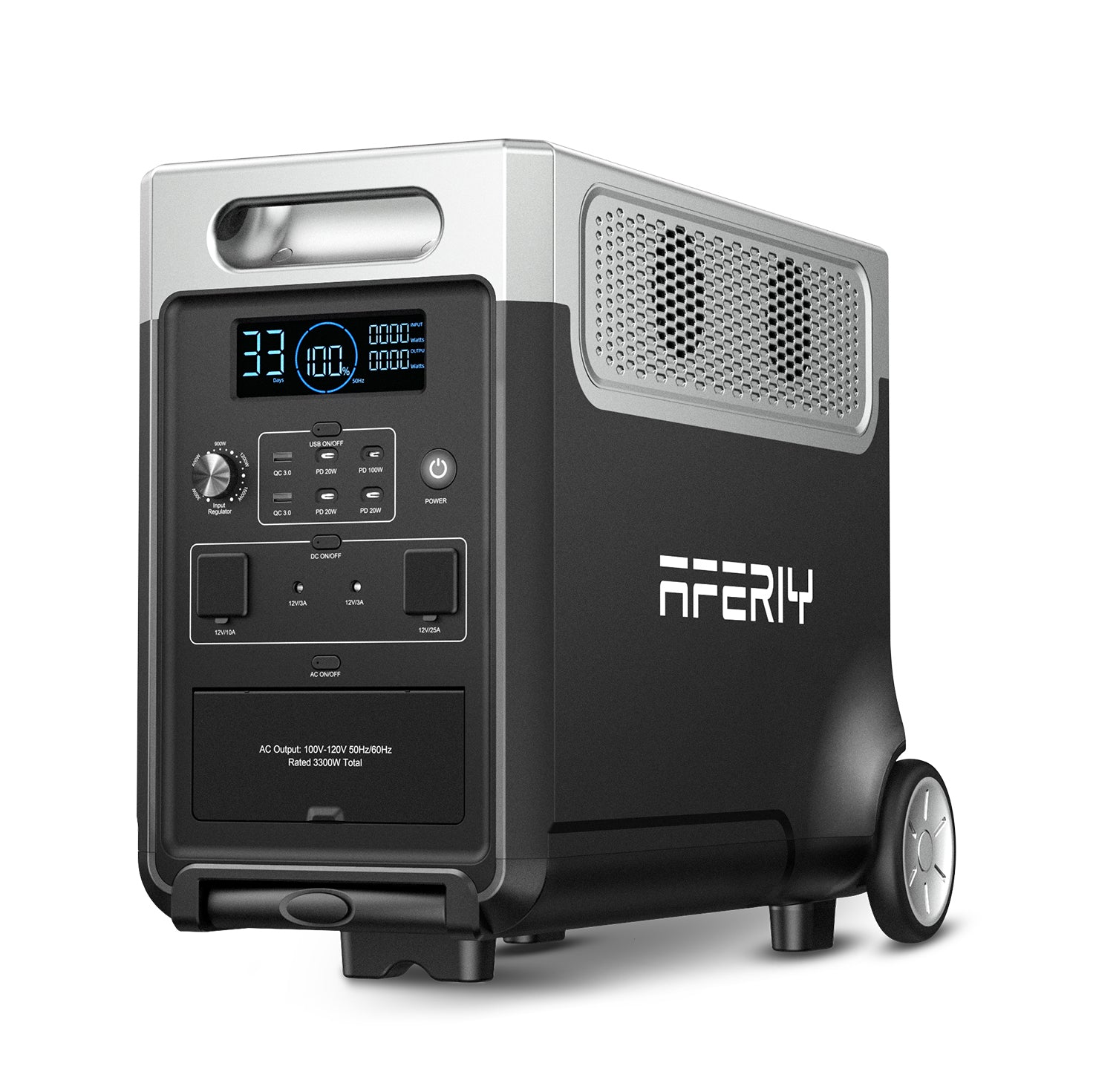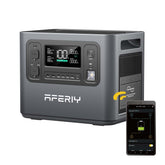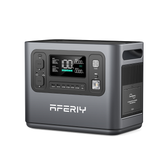-
AFERIY XT90 ACC Car Charging CableInterface: XT90; Compatible with: AFERIY AF-P110 1200W/AF-P210 2400W/AF-P310 3600W Portable Power Station Extremely durable; Red is positive, and black is negative; Shipping: Estimated delivery time is 10 business days;
- $25.99
- $25.99
- Unit price
- per
-
AFERIY Solar Panel Extension Cable 5M5m 12AWG solar extension cable. Moisture, High/Low Temperature Resistance, UV and corrosion resistance, and IP67 Waterproof. High Strength, Abrasion Resistance Designed for outdoor solar panel charing use. Hard plastic connectors at each end, female and male connectors. Easy to lock and open. Shipping: Estimated delivery time is 10 business days;
- $39.99
$59.99- $39.99
- Unit price
- per
Save $20.00 -
AFERIY 4 in 1 Solar Generator Connector Cable4 in 1 Solar Connector Compatible with DC5.5x2.1mm, XT60, XT90 and Anderson plug Plug and Play, Without any installation Female plug is POSITIVE and Male plug is Negative. The RED wire is positive (+) and the BLACK wire is negative(-)
- $32.99
$32.99- $32.99
- Unit price
- per
Save $0.00 -
AFERIY XT60 ACC Car Charging CableInterface: XT60; Compatible with: AFERIY AF-P010 800W Portable Power Station Extremely durable; Red is positive, and black is negative; Shipping: Estimated delivery time is 10 business days;
- $25.99
- $25.99
- Unit price
- per
Recently Viewed Products
Example product title
- $19.99
- $19.99
- Unit price
- per
Example product title
- $19.99
- $19.99
- Unit price
- per
Example product title
- $19.99
- $19.99
- Unit price
- per
Example product title
- $19.99
- $19.99
- Unit price
- per
Example product title
- $19.99
- $19.99
- Unit price
- per
Example product title
- $19.99
- $19.99
- Unit price
- per
Example product title
- $19.99
- $19.99
- Unit price
- per
Example product title
- $19.99
- $19.99
- Unit price
- per
Example product title
- $19.99
- $19.99
- Unit price
- per
Example product title
- $19.99
- $19.99
- Unit price
- per
FAQs
How do I choose the right battery cable connectors for my setup?
Choosing the right battery cable connectors depends on the voltage, current, and the specific devices you're connecting. You’ll need to match the gauge of the cable with the connector’s specifications to ensure safe operation. Look for battery cable connectors that are rated for your system’s amperage and have solid insulation. Consider the connector type—such as ring, spade, or quick-disconnect—to match your terminal style. If you're working with vehicles or solar setups, compatibility is especially critical.
Always verify that your battery cable connectors are corrosion-resistant, especially if used outdoors or in high-humidity environments. For maximum efficiency and safety, opt for connectors made from high-conductivity materials like copper. Proper battery cable connectors can reduce power loss and improve current delivery across your setup.
Always verify that your battery cable connectors are corrosion-resistant, especially if used outdoors or in high-humidity environments. For maximum efficiency and safety, opt for connectors made from high-conductivity materials like copper. Proper battery cable connectors can reduce power loss and improve current delivery across your setup.
Can I use battery cable connectors for solar power systems?
Yes, battery cable connectors can be used in solar power systems to connect batteries, inverters, and charge controllers. When choosing battery cable connectors for solar setups, ensure they are compatible with deep-cycle batteries and rated for continuous power delivery. They should also handle the expected voltage and current that your system generates. Proper sizing and installation of these connectors are crucial to prevent overheating or voltage drops.
Many solar systems require durable, weatherproof battery cable connectors that can handle outdoor conditions. Look for UV-resistant and waterproof options for longer-lasting performance. Using high-quality battery cable connectors in your solar configuration enhances safety and ensures efficient energy transfer between components.
Many solar systems require durable, weatherproof battery cable connectors that can handle outdoor conditions. Look for UV-resistant and waterproof options for longer-lasting performance. Using high-quality battery cable connectors in your solar configuration enhances safety and ensures efficient energy transfer between components.
Do battery cable connectors affect charging speed or voltage?
Yes, battery cable connectors can impact both charging speed and voltage, depending on their conductivity and size. If the connector is too small or made of low-quality material, it can introduce resistance, leading to voltage drops and slower charging. Always use battery cable connectors that are properly rated for your system’s amperage and compatible with the cable gauge.
Improper or loose battery cable connectors can also generate heat, reducing efficiency and potentially damaging your equipment. Choosing high-conductivity materials like copper and ensuring secure connections will help maintain optimal voltage levels and fast charging speeds. Well-matched battery cable connectors are essential for stable power flow in any setup.
Improper or loose battery cable connectors can also generate heat, reducing efficiency and potentially damaging your equipment. Choosing high-conductivity materials like copper and ensuring secure connections will help maintain optimal voltage levels and fast charging speeds. Well-matched battery cable connectors are essential for stable power flow in any setup.
Are all solar panel extension cords compatible with any solar panel?
Not all solar panel extension cords are universally compatible, as different solar panels may use varying connector types such as MC4, Anderson, or SAE. Before purchasing a solar panel extension cord, always check your solar panel's output connector type and match it accordingly. Using incompatible cords can lead to inefficient energy transfer or damage to your equipment.
It's also important to consider the cord’s voltage and amperage rating. A solar panel extension cord must be rated to handle the power output of your system. For off-grid, RV, or camping use, ensure your solar panel extension cords are also weather-resistant and UV-protected for safe outdoor operation.
It's also important to consider the cord’s voltage and amperage rating. A solar panel extension cord must be rated to handle the power output of your system. For off-grid, RV, or camping use, ensure your solar panel extension cords are also weather-resistant and UV-protected for safe outdoor operation.
What type of connectors are used on solar panel extension cords?
Solar panel extension cords often come with MC4 connectors, which are the industry standard for many solar panels due to their reliability and weather resistance. Some systems may also use Anderson Powerpole or SAE connectors, especially in portable or DIY solar setups. It's essential to identify your panel’s connector type before choosing a solar panel extension cord to ensure a secure and efficient connection.
The type of connector affects not only compatibility but also ease of installation and system performance. High-quality solar panel extension cords with waterproof and UV-resistant connectors are ideal for outdoor use. Selecting the correct solar panel extension cord and connector combination ensures safe and efficient power transmission in your solar setup.
The type of connector affects not only compatibility but also ease of installation and system performance. High-quality solar panel extension cords with waterproof and UV-resistant connectors are ideal for outdoor use. Selecting the correct solar panel extension cord and connector combination ensures safe and efficient power transmission in your solar setup.
Can I use a car charging cable with a portable power station?
Yes, a car charging cable can often be used with a portable power station, especially if the station supports 12V DC input or features a cigarette lighter-style port. Many power stations include adapters that make car charging cable connections simple and effective. This allows you to recharge your station using your vehicle’s battery when grid power isn’t available.
However, not all power stations are designed to accept input from a car charging cable, so you should always check the compatibility in the user manual. Using a proper car charging cable ensures safe and efficient charging while on the move, making it a great option for road trips, camping, or emergency use.
However, not all power stations are designed to accept input from a car charging cable, so you should always check the compatibility in the user manual. Using a proper car charging cable ensures safe and efficient charging while on the move, making it a great option for road trips, camping, or emergency use.
Do car charging cables affect charging speed?
Yes, the quality and specification of a car charging cable can significantly impact charging speed. Factors such as wire gauge, length, and material determine how quickly your electric vehicle or portable device receives power. A thicker car charging cable (lower gauge) allows more current to flow, reducing charging time. On the other hand, a thin or poorly insulated car charging cable may cause overheating or voltage drops.
Always use a car charging cable rated for your specific vehicle and power source to ensure optimal performance. High-speed charging also depends on your EV’s onboard charger capacity, but the car charging cable remains a crucial factor in the charging equation.
Always use a car charging cable rated for your specific vehicle and power source to ensure optimal performance. High-speed charging also depends on your EV’s onboard charger capacity, but the car charging cable remains a crucial factor in the charging equation.
Does cord length affect solar panel performance?
Yes, the length of a solar panel extension cord can affect performance due to electrical resistance. The longer the solar panel extension cord, the greater the resistance, which can result in voltage drops and power loss. This is especially noticeable in lower voltage systems. To minimize energy loss, always use the shortest solar panel extension cord possible and opt for thicker cables (lower gauge) for longer runs.
Using high-quality solar panel extension cords with proper shielding can also help reduce interference and maintain power efficiency. When planning your solar setup, consider the cord length as a factor that directly influences performance and overall energy yield.
Using high-quality solar panel extension cords with proper shielding can also help reduce interference and maintain power efficiency. When planning your solar setup, consider the cord length as a factor that directly influences performance and overall energy yield.
How long can a solar panel extension cord be without losing efficiency?
The maximum length of a solar panel extension cord without significant efficiency loss depends on the system’s voltage and the cord’s wire gauge. For a 12V system, even 10–15 feet of a thin solar panel extension cord can cause voltage drops. However, using a 10-gauge wire can extend that distance to around 25 feet with minimal loss. Higher voltage systems, like 24V or 48V, allow for longer cords while maintaining efficiency.
To optimize power delivery, select solar panel extension cords with thick conductors and limit the cord length when possible. Proper planning and high-quality solar panel extension cords help ensure your system runs smoothly, even with extended cable runs.
To optimize power delivery, select solar panel extension cords with thick conductors and limit the cord length when possible. Proper planning and high-quality solar panel extension cords help ensure your system runs smoothly, even with extended cable runs.
- Choosing a selection results in a full page refresh.

